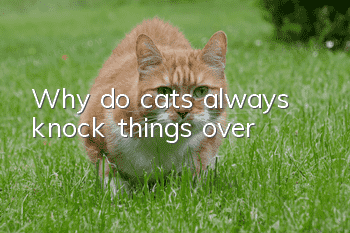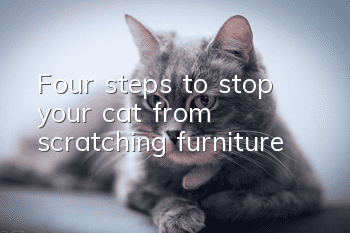Why do cats always knock things over?

No matter how cute they are, cats sometimes make strange roommates. When they're not swooping down at our feet, they're sitting on our heads or leaving unwelcome gifts on our doorsteps. Another thing is messing up. If there's one thing every cat owner is very familiar with, it's the sound of breaking glass. If you spend too much time cleaning up broken glass, collecting scattered pencils, and cleaning up your cat's poop, it's time to get to the bottom of their behavior. Here’s what you need to know about why cats knock things over…and what you can do about it.
Why do cats knock things over?
Most cats like to slap things on the floor, but why do they do it? As it turns out, it could be one of a number of reasons.
1. Predatory instinct
Predatory instinct is one of the main explanations for why cats knock things over. After all, cats are born killers. Years of domestication may have given them a taste of the finer things in life, but no amount of meals on tap or comfortable beds can change their basic makeup. They are naturally wired to hunt, and unfortunately, this can have consequences for your decorations. If a cat wants to know what something is, whether it's safe, and (in the case of prey) whether it's dead, they will test it with their paws. Obviously, cats aren't stupid—they don't need to touch them to know the difference between a mouse and a vase—but the instinct to explore, swat, and swat at things with their paws is so ingrained in their DNA that they can't resist it.
2. Attention
Cats may be known for their independence, but that doesn't mean they don't like to take the spotlight from time to time. Luckily for them, they also know how to get our attention, which is lucky for them and not so lucky for us. If they want us to feed them, play with them, or just watch them, they'll know from past experience that knocking over a cup or knocking over a jar is sure to make us run. The more attention we give this behavior, the longer they persist.
3. Curiosity
Cats are smart little cookies who like to know what, why and how everything around them is. Introduce something new to the house that they will not only notice, but want to see. Since they're too curious to simply stare at it, this usually means they'll poke it once or twice with their paws.
4. Play
If a cat is bored and wants to play, they will find a way to do so, regardless of the consequences for your nice and tidy home. Knocking over an object combines the tactile pleasure of exploring something with your paws, and the thrill of the hunt when it hits the ground. After that, they can declare it dead on the spot, or turn it into a toy and bat it around. Either way, it's a lot more fun than sitting around doing nothing. Every cat gets bored from time to time, but cats' behaviors tend to show up the most if they don't schedule enough playtime and exercise into their day.
How to prevent cats from knocking things over?
It may be a completely natural instinct for a cat to poke and swat at things with its paws, but that doesn't make it any less frustrating. . Or dangerous. Knocking over a pencil may be harmless, but knocking over and breaking a glass vase or porcelain cup could have far worse consequences. While you're unlikely to stop this behavior entirely, there are several ways to reduce it. This includes…
1. Ignore them
Since cats will often knock things over to get your attention, the best thing you can do is keep any breakable items out of sight when they are trying to attract your attention in this way. When your attention is focused, ignore them. Even negative attention can be helpful, so avoid looking at them, scolding them, or doing anything other than focusing on what you were doing before you heard the crash (unless something broke, in which case (preferably before any accident occurs). Once they know their behavior won't get them what they want, they are less likely to do it.
2. Deceive them
If you can stop your cat from jumping on certain surfaces, you're a few steps closer to stopping them from knocking things over. Hepper. com recommends applying a layer of aluminum foil or double-sided tape to the surface you want them to stay away from. Most cats don't like the feel of tape or foil on their paws and will stay away from the surface in the future.
3. Stick to the schedule
If your cat’s needs aren’t being met, you can’t blame them for trying to get your attention. If their water bowl is empty or it's two hours later than usual lunch time, they'll do whatever they can to get you moving. Keep their water bowls filled and stick to the same feeding schedule each day so they don't panic because of hunger. Some people also find that putting a bowl of dog poop down so their cats know they can always find food.
4. Play with them
Cats nod most of the day, but during the brief moments they are awake, give themEnough meaningful interactions are important. Mental stimulation through games like puzzle feeders, as well as toys that tap into their stalking and hunting instincts, will help them burn enough energy to prevent boredom (and destructive behavior). In addition to scheduling time throughout the day to play with them, provide them with enough toys and sticky notes so they can entertain themselves while you're away.
- How to tell if a Birman cat is pregnant
- Should kittens be kept in cages or free-range?
- Why don’t cats suck catnip?
- How cats get pyoderma
- The Difference Between British Shorthair Black and White Cats and Cow Cats
- Can cats eat meat floss?
- Why can’t we keep Norwegian forest cats?
- The kitten scratched someone before it was vaccinated
- Will cats get angry if they eat chicken liver?
- Why do British Shorthair cats scratch things?



